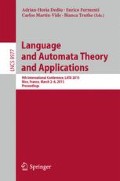Abstract
A partial word is a word which contains some holes known as do not know symbols and such places can be replaced by any letter from the underlying alphabet. We study the relation between language of primitive partial words with the conventional language classes viz. regular, linear and deterministic context-free in Chomsky hierarchy. We give proofs to show that the language of primitive partial words over an alphabet having at least two letters is not regular, not linear and not deterministic context free language. Also we give a 2DPDA automaton that recognizes the language of primitive partial words.
Access this chapter
Tax calculation will be finalised at checkout
Purchases are for personal use only
Preview
Unable to display preview. Download preview PDF.
References
Aho, A.V., Hopcroft, J.E.: Design & Analysis of Computer Algorithms. Pearson Education India (1974)
Blanchet-Sadri, F., Zhang, J.: On the critical factorization theorem (preprint)
Blanchet-Sadri, F.: Primitive partial words. Discrete Applied Mathematics 148(3), 195–213 (2005)
Blanchet-Sadri, F.: Algorithmic combinatorics on partial words. CRC Press (2007)
Blanchet-Sadri, F.: Open problems on partial words. In: Bel-Enguix, G., Dolores Jiménez-López, M., Martín-Vide, C. (eds.) New Developments in Formal Languages and Applications. SCI, vol. 113, pp. 11–58. Springer, Heidelberg (2008)
Blanchet-Sadri, F., Davis, C., Dodge, J., Mercaş, R., Moorefield, M.: Unbordered partial words. Discrete Applied Mathematics 157(5), 890–900 (2009)
Dömösi, P., Horváth, G.: The language of primitive words is not regular: two simple proofs. Bulletin of European Association for Theoretical Computer Science 87, 191–194 (2005)
Dömösi, P., Horváth, S., Ito, M., Kászonyi, L., Katsura, M.: Formal languages consisting of primitive words. In: Ésik, Zoltán (ed.) FCT 1993. LNCS, vol. 710, pp. 194–203. Springer, Heidelberg (1993)
Dömösi, P., Ito, M., Marcus, S.: Marcus contextual languages consisting of primitive words. Discrete Mathematics 308(21), 4877–4881 (2008)
Hopcroft, J.E., Motwani, R., Ullman, J.D.: Introduction to automata theory, languages, and computation. ACM SIGACT News 32(1), 60–65 (2001)
Horváth, G., Nagy, B.: Pumping lemmas for linear and nonlinear context-free languages. arXiv preprint arXiv:1012.0023 (2010). http://arxiv.org/abs/1012.0023
Horváth, S.: Strong interchangeability and nonlinearity of primitive words. In: Proc. Workshop AMAST Workshop on Algebraic Methods in Language Processing, vol. 95, pp. 173–178 (1995)
Kunimochi, Y.: A context sensitive grammar generating the set of all primitive words. In: Algebras, Languages, Computations and their Applications, vol. 1562, pp. 143–145 (2007)
Leupold, P.: Languages of partial words. Grammars 7, 179–192 (2004)
Leupold, P.: Primitive words are unavoidable for context-free languages. In: Dediu, A.-H., Fernau, H., Martín-Vide, C. (eds.) LATA 2010. LNCS, vol. 6031, pp. 403–413. Springer, Heidelberg (2010)
Lischke, G.: Primitive words and roots of words. arXiv preprint arXiv:1104.4427 (2011). http://arxiv.org/abs/1104.4427
Miller, G.A., Chomsky, N., Luce, D.R., Bush, R.R., Galanter, E.: Handbook of mathematical psychology (1963)
Petersen, H.: The ambiguity of primitive words. In: Enjalbert, P., Mayr, Ernst W., Wagner, K.W. (eds.) STACS 1994. LNCS, vol. 775, pp. 679–690. Springer, Heidelberg (1994)
Petersen, H.: On the language of primitive words. Theoretical Computer Science 161(1), 141–156 (1996)
Shallit, J.: A second course in formal languages and automata theory. Cambridge University Press (2008)
Author information
Authors and Affiliations
Corresponding author
Editor information
Editors and Affiliations
Rights and permissions
Copyright information
© 2015 Springer International Publishing Switzerland
About this paper
Cite this paper
Nayak, A.C., Kapoor, K. (2015). On the Language of Primitive Partial Words. In: Dediu, AH., Formenti, E., Martín-Vide, C., Truthe, B. (eds) Language and Automata Theory and Applications. LATA 2015. Lecture Notes in Computer Science(), vol 8977. Springer, Cham. https://doi.org/10.1007/978-3-319-15579-1_34
Download citation
DOI: https://doi.org/10.1007/978-3-319-15579-1_34
Published:
Publisher Name: Springer, Cham
Print ISBN: 978-3-319-15578-4
Online ISBN: 978-3-319-15579-1
eBook Packages: Computer ScienceComputer Science (R0)

